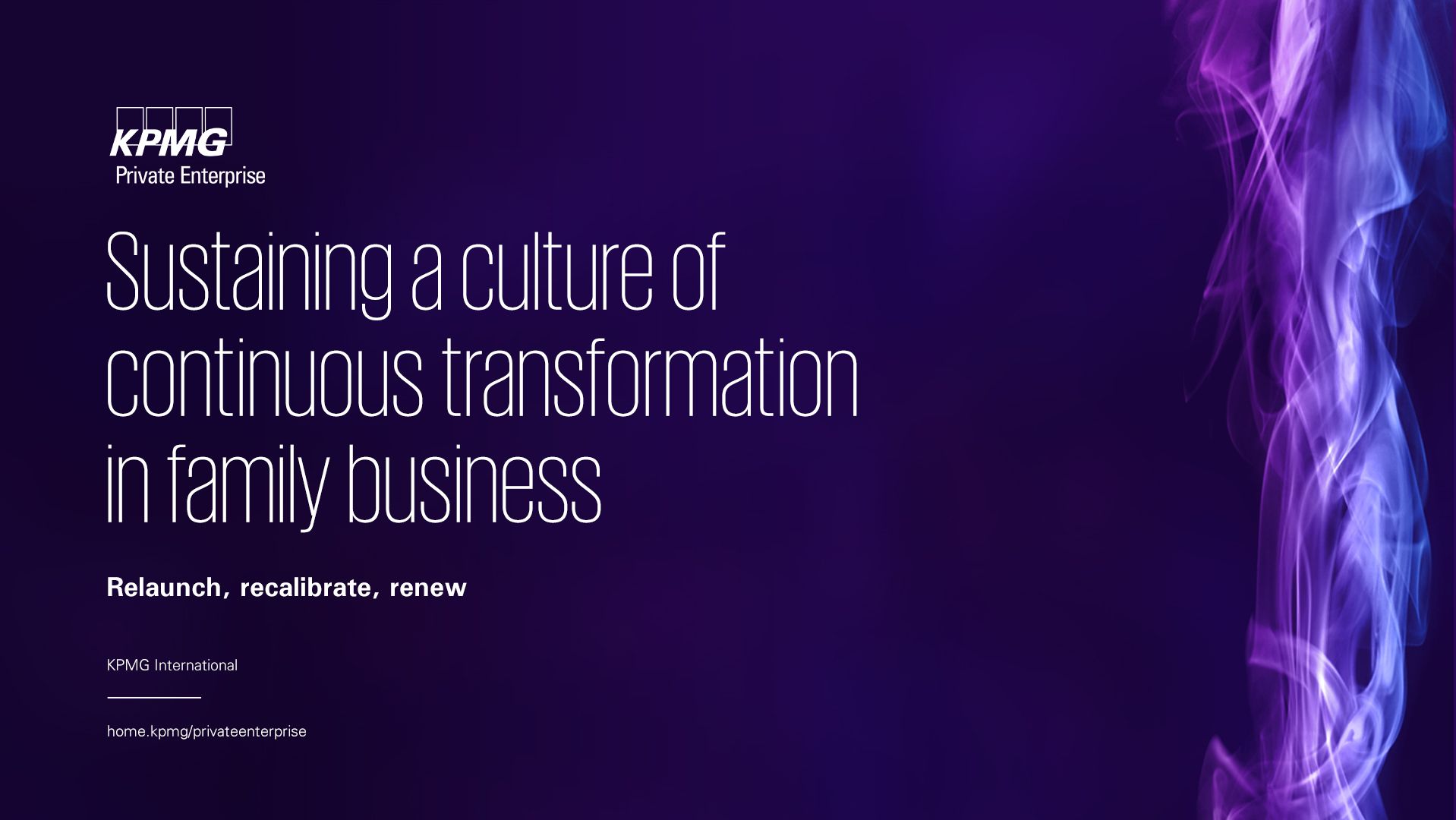We are pleased to introduce a new article series from KPMG Private Enterprise exploring how family businesses are adopting new ways of thinking and driving continuous innovations that are preparing their businesses and their families for future opportunities in light of the current landscape. The articles provide practical examples of how family businesses are keeping their minds open and turning emerging trends into the drivers of their future growth and success.
This first article ‘Sustaining a culture of continuous transformation in family business’ focuses on the broad topic of business transformation and shares insights from family business leaders on their approach to business transformation and how it sustains their purpose, values and the long-term success of their businesses.
What’s driving the transformation of your family business?
Who is accountable? Have the risks been considered? How are you measuring your success?
Who is accountable?
Clear accountability for achieving results can be an important form of recognition in family businesses. And the importance of shared accountability for achieving a culture of continuous transformation can be the bedrock of many family businesses as the business and the family both evolve over time.
Business transformation – is it a potentially risky business?
Continuous transformation doesn’t come without risk. Clear visibility is needed of the internal and external risks that can affect the business, strategy or transformation model. An Enterprise Risk Management (ERM) assessment can be a key exercise to help address or eliminate the risks.
The need to re-recruit the family
For sustainable ownership and management, family members should remain excited about the business, especially younger generations with new skills and talents. It’s important not to lose sight of the family’s shared purpose, vision and values to continuously re-recruit family members.
Is change fatigue setting in?
With continuous transformation, there is the potential for “change fatigue” and the amount of churn in the workforce is one indicator of waning energy. The key is to have good policies and procedures in place so when turnover occurs it isn’t too disruptive.
The unseen driver of financial performance
There is often a correlation between the financial performance and the involvement of an independent director. With formal board evaluations to assess the performance of the board as a whole, significant improvements have been seen in business performance.
How are you measuring success?
Family members’ roles and accountabilities may be blurred for the family and non-family employees. It is important to have everyone’s roles and responsibilities clearly defined and for employees to know how their performance is measured.
Sustaining a culture of continuous transformation in family business
The need to transform many companies — even entire industries — is the next stage in dealing with the impact of the pandemic. In the past, the need for change generally targeted a specific area of a company’s operations, such as restructuring the sales function or implementing a new performance management system. The far-reaching impact of the pandemic on businesses and society has changed that thinking.
The impetus for companies to transform their businesses in this new environment is taking the concept of change to a much higher level, which is being driven by the need to assess and potentially reinvent several aspects of businesses from top to bottom. Transformation is not a new idea in the world of family businesses, as heard in the recent KPMG Private Enterprise roundtable discussions with senior family business leaders across the world.
The conversations with these leaders were candid and forward-looking. KPMG Private Enterprise is pleased to be able to share these experiences and views on what has been described as a ‘culture of continuous transformation’ that is woven into the fabric of their businesses.
The pandemic was a stark reminder that the only way to move forward is by being sensitive to what’s happening in all of our surroundings. This requires a combination of proactive efforts and deciding where we want to go, while also being ready and agile enough to respond to the environments that exist and change around us.
"Urgent and dramatic changes put a lot of strain on any business from a cultural perspective and on their people. Our view is that we’re far better off being a progressive business that constantly adapts, looks at incremental progression and is progressive in its views — continuously adapting, evolving and changing. It’s far easier to make changes stick longer term rather than having to turn the ship around in a very short period of time."
John Murphy
CEO, Murphy Group
UK
What sets business transformation apart in family businesses?
Family businesses, like most other business types, had to react quickly to the sudden impact of the pandemic. Necessary changes were made, but the kind of change that is truly transformative is proactive, not reactive. The continuous transformation mindset is driven, first and foremost, by the family’s purpose and values, their continuous search for new opportunities, and their agility to mitigate potential threats.
Craig Robinson, Joint Managing Director of South Africa’s Ultra Liquors chain echoed this sentiment, “Being agile and taking quick decisions is not so much about change management, but about uncovering new opportunities to gain a competitive advantage. We talk about transformation opportunities every day — to revolutionize the way we do things and to embrace ideas from people of different backgrounds who continue to revitalize our company’s culture.”
This mindset is also reflected in the resolve of business families to focus on the long term; to keep finding new ways to adjust their businesses in tune with the evolving needs and priorities of their stakeholders.
Family business leaders describe their role as the “drivers of change”, not the “passengers”.
Beyond digital
The roundtable participants agreed that business transformation includes everything that is important to the family business and the business family which includes — but is not solely focused on — its technology and operating systems. They emphasized the importance of distinguishing digital transformation as an enabler of change from the broad transformation that might be required across most of the business itself.
Sustainability and the environmental, social and corporate governance (ESG) agendas of the family business and the business family are also becoming new driving forces behind the need to transform the business. They recognize that ESG links back to the shared purpose of the family and the culture of the business. It also helps drives the choices that customers make, strives to ensure the supply chain is ethical, and makes it a priority to collect and report accurate data that gauges the impact of their actions.
I think of business transformation as a spectrum. A lot of family businesses sorted out their back offices during the pandemic to save costs and manage their liquidity. As the pandemic wore on, it became evident that online trading was getting bigger, and they had to respond to what customers were demanding. That is now evolving further and influencing customer choice, including how customers respond to the companies they deal with, based on their ESG strategies and impact.
Digital transformation and business transformation are not synonymous. Technology can enable change, but alone it is unlikely to transform the business.
Who should be accountable for continuously transforming your business?
In a typical corporate setting, roles and responsibilities are narrowly defined and accountabilities are prescribed. Employees have titles, role descriptions and they work within the scope of those roles.
In family businesses that are more fluid, family members might take on multiple roles, and they’ll often lend an extra helping hand wherever and whenever it’s needed. With a more flexible structure compared to corporate enterprises, they are also often known to change and evolve with the entry of next-gen family members who bring new skills and expertise to the table.
In family businesses, the family’s identification with the business and their shared values also generates an added layer of personal accountability. As one family business leader described, “The family is the business, and the business is the family. When things aren’t going well in a family, you can’t just throw up your hands and walk away. The same is true for the family business.”
However, there are concerns among some family business leaders that if a family is running the business and owning it, they are essentially reporting to themselves. Could this lead to potential problems if they aren’t answerable to someone who has an objective perspective and holds them to account by asking the right questions?
"I’m familiar with some businesses where everyone wants to keep the peace in the family so no one takes accountability for the actions or decisions that are taken in the business. In others, if someone makes a decision that could damage the business, there are no consequences. The socio-economic impact of not driving accountability is potentially destructive.
In these situations, I believe there is a need to formalize the roles, responsibilities and performance expectations for everyone in the business. That way not only are there consequences to peoples’ actions and decisions, but it will ensure that the most appropriate people are making the decisions for the long term sustainability of the business."
Alan Barr
National Private Enterprise Leader, Partner
KPMG in South Africa
The roundtable participants expressed an interest in introducing more formal accountability for business results — such as external independent directors on the company board or on advisory boards that typically don’t have voting authority or control, but do have the ability to hold management to account.
Taking it a step further, Marian O'Gorman, Group Executive Chairperson of Kilkenny Group, made the case for a non-family CEO to lead the business at the appropriate time: “I would recommend that every family business consider bringing in an external CEO if they’re looking to grow in a different way and recognize they may not have the right skills within the family. Family business owners will recognize when the time has come to turn over the leadership to a non-family member who will be accountable for transforming the business.”
In a culture of continuous transformation, someone should be accountable for making sure that there’s the drive, pressure, energy and dedication to understanding what’s really happening in the business, what the future prospects look like and in taking action. That person should sit at — or have direct access to — the decision-making table.
These and many other practical insights from family business leaders and KPMG Private Enterprise professionals across the world can be one of the guides for sustaining a culture of continuous transformation. You are encouraged to download the full article if you’re interested in learning more about how to relaunch, recalibrate and renew your family business.
And be sure to watch for the second article in the series on the subject of social responsibility — the strategies behind it, the impact it has on family business performance and how operating a socially responsible business can reinforce the values of the family and the value they derive as owners of the business.







